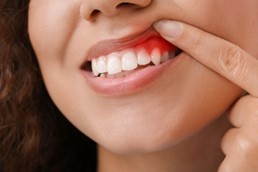
Dental implants boast a remarkable 98% success rate, making them a preferred choice for replacing missing teeth. However, that doesn’t mean that your work is over after having them place. Post-surgery care is crucial to ensure a smooth recovery. Avoiding certain foods can significantly aid the healing process. Read on to learn about foods to avoid, suitable substitutes, and potential side effects of dental implant placement.
What to Expect
Dental implant surgery is generally safe, but you might experience some side effects. A common issue is pain for a few days post-procedure, typically manageable with over-the-counter pain relievers. Be sure to avoid Aspirin, as it can increase bleeding. If necessary, your dentist may prescribe a stronger painkiller.
Swelling around the incision site is also normal and usually subsides on its own; applying ice can help reduce it. Serious complications are rare, but if they occur, prompt treatment is essential. Infections at the incision site require immediate attention to prevent spreading and are typically treatable with antibiotics. Less common side effects of implant surgery include sinus issues and nerve damage, but these are rare.
Foods to Avoid
Maintaining a proper diet after implant surgery is essential for a smooth recovery. To support healing and prevent complications, avoid certain foods during the early stages of recovery. Here are some foods to avoid:
- Crunchy foods – This includes nuts, popcorn, chips, crackers, and hard candies, as they can get stuck in the incision site.
- Sticky or chewy foods – Avoiding chewy or sticky food will help prevent discomfort and lessen the need for excessive chewing.
- Alcohol – Consuming alcoholic beverages can lead to delays in healing.
- Spicy foods – Consuming spicy foods can irritate the incision site.
Foods to Eat Instead
After dental implant surgery, eating soft, easy-to-chew foods can aid your recovery and reduce discomfort. Here are some recommended options for your diet:
- Applesauce – This pureed fruity snack is high in dietary fiber as well as vitamin C.
- Plain yogurt – Full of vitamin D and protein, plain yogurt can contribute to your oral health.
- Mashed potatoes – This high-fiber side dish is great after dental implant surgery.
- Soft, hot cereals – You can reincorporate foods like instant oatmeal, grits, or porridge into your diet a few days post-surgery once your gums are less sensitive.
- Warm, broth-based soups – These are high in protein, which is essential for tissue repair and regeneration.
Dental implant surgery can significantly enhance your life by restoring your smile. Choosing the right foods is crucial for a successful recovery. By following a proper diet, you can help ensure a smooth healing process and enjoy the full benefits of your new smile.
About the Practice
Northern Virginia Oral, Maxillofacial & Implant Surgery provides exceptional care to patients in Alexandria, Reston, and nearby communities, helping them achieve beautiful, brag-worthy smiles. They focus on personalized treatment plans that emphasize diagnosis, treatment, and prevention for the best possible results. Their mission is to build lasting relationships based on trust, ensuring ongoing care for years to come. To schedule an appointment or learn more about dental implants, contact their Alexandria office at (571) 777-6501, their Reston office at (703) 912-0052, or visit their website.
